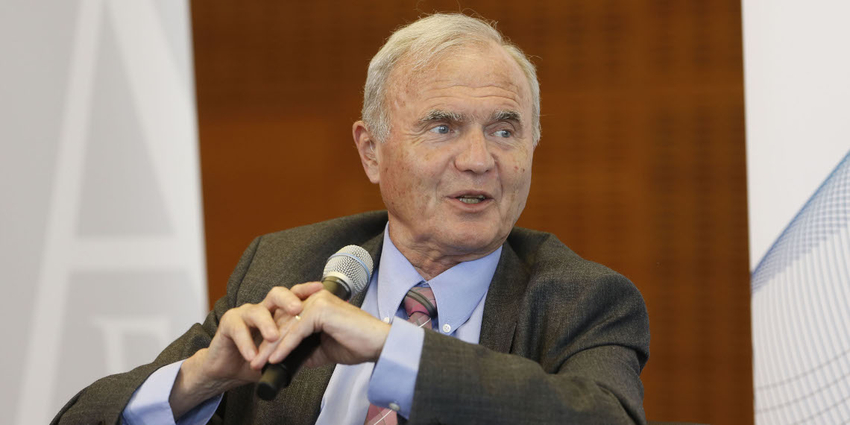The impact Otmar Issing has had on economic and, in particular, financial research in Frankfurt rings true from his own words: “The Center for Financial Studies has become my academic home, I have invested effort in the Leibniz Institute for Financial Research SAFE from the first steps in its creation to the final establishment, and I can also claim to have contributed to the Goethe University’s selection as a location for the Institute for Monetary and Financial Stability.” Finally, he also looks back on a long history of cooperation with the Institute for Banking and Financial History (IBF), the economist said.
Thus interconnected, CFS, SAFE, IMFS, and IBF had jointly organized an academic colloquium entitled "Money and Prices: A Permanent Puzzle" on 29 June 2021. Not only representatives of the institutes but also Issing's companions and renowned financial researchers acknowledged the 85-year-old's lifetime work on the occasion of his birthday in March. However, the digital event did not only focus on Issing's commitment to the participating academic institutes. Having served as a member of the German Council of Economic Experts from 1990 to 2006, Issing spent a good eight years each at the German Bundesbank and the European Central Bank as a member of the Executive Board and Chief Economist. The footprints the CFS president left at both central banks prompted the academic colloquium to discuss current requirements for monetary policy together with Issing.
A common thread preceded all the individual remarks: Otmar Issing has left a lasting mark on central bank policy. Bundesbank President Jens Weidmann and the president of the Swiss bank UBS Axel Weber attested to Issing’s status as a "role model" during the colloquium. His merits and achievements are “well known around the globe,” said Doris Fischer, Vice President of the University of Würzburg, Issing’s alma mater. Former ECB President Jean-Claude Trichet whom Issing worked with closely, stressed that two successes largely can be ascribed to the ECB's monetary policy as orchestrated by Issing: the stability of the euro compared with the individual national currencies that previously existed in the EU and the acceptance of the euro by the European population. Indeed, Issing has helped “giving birth“ to the euro and was one of the leading minds behind the ECB's monetary policy strategy, as drafted in 1998 and revised in 2003, but now under criticism after the most recent adjustment in July 2021.
Jan Pieter Krahnen stressed that he especially took away the aspect of regulatory policy ("Ordnungspolitik") from the professional cooperation in the so-called "Issing Commission". From 2008 to 2012, the SAFE Director, like Jens Weidmann, was a member of the expert group on “Neue Finanzmarktarchitektur" (New Financial Market Architecture) chaired by Otmar Issing, which, on behalf of the German government, presented several reports on possible reforms of the international financial markets. The responsible European institutions are tied to a democratic mandate that must not be overstepped without further ado, Krahnen said. If this mandate had to be widened, a legal basis would first have to be established before specific political steps could be taken. A prime example of this is the yet-to-be-completed banking union as a new supervisory architecture in Europe and a response to the "too big to fail" problem concerning credit institutions. "The banking union is a regulatory policy in the best sense,” Krahnen explained.
“Money is a social convention”
Markus Brunnermeier from Princeton University started his presentation on the colloquium's topic with a quote from Otmar Issing: “Money is a social convention”. In this sense, money and currencies function like a kind of language as a means of communication. Central bank policy should also be viewed from this perspective, Brunnermeier said: Controlling currencies on which contracts are based allow control over monetary policy. Using different currencies is declining with the emergence of new technologies that also pose new challenges for central banks such as dealing with digital central bank money, Brunnermeier continued. However, the three essential functions of money - as a unit of account, a medium of exchange, and a store of value - remain unchanged in the course of the digital transformation. "We need the uniformity of money to ease price comparisons and eliminate exchange rate risks," Brunnermeier explained since prices changed in the sense that their transparency across commodities and over time increases.
In the meantime, however, as Issing himself assessed in response to Brunnermeier’s presentation, cryptocurrencies, issued privately or by central banks, will make the complex relationship between money and prices even more difficult. To attach a tangible dimension to this fact, IMFS Director Volker Wieland interjected: The current market capitalization of all existing private digital currencies is 1100 billion euros, about half of which is Bitcoin.
Alarming signals in the euro area
Furthermore, Issing was alarmed by the fact that central banks still seem to rely on models which had probably lost much of their forecasting capacity years ago. “These models lack an appropriate, finance-based theoretical explanation of the simultaneous determination of financial flows, risk premia, and asset prices”, the economist said. He did not want to predict the return of high inflation to Europe in the foreseeable future. However, he was concerned by massive purchases of government bonds by central banks. “The main risk, from my perspective, is that central banks seem to be rather relaxed about the risks and ignoring the high degree of uncertainty”, Issing said. The former central banker sees an alarming signal of the high uncertainty that quite some observers predict not high inflation for the euro area, but, similar to the situation in Japan, very low inflation, high public deficits, and increasing fiscal and financial dominance. However, this kind of situation might not prove politically sustainable in Europe. “Europe is not Japan because of the rapid increase in wealth inequality and eventually a lack of confidence of financial investors in the sustainability of public finances”, Issing explained in his closing remarks.

